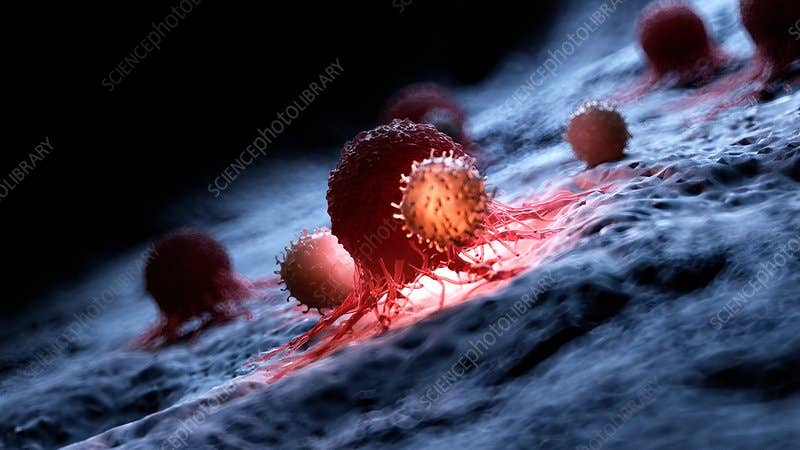Breakthrough mini-protein revolutionizes how we treat cancer
A new mini-protein delivers radiation directly to tumors expressing Nectin-4, offering a safer, more targeted cancer treatment approach.

A new mini-protein delivers targeted radiation to tumors, sparing healthy cells and showing promise for hard-to-treat cancers. (CREDIT: 3DMEDISPHERE / SCIENCE PHOTO LIBRARY)
A breakthrough in cancer treatment may soon change how some of the most aggressive tumors are managed. A small, specially-designed protein known as AKY-1189 has shown it can carry radiation directly to cancer cells, while sparing the healthy ones around them. This tiny carrier, also called a radiopharmaceutical, could become a powerful new tool in the fight against several solid tumors.
The findings were presented at a recent global cancer symposium in Barcelona. Scientists explained how this new protein zeroes in on a target called Nectin-4. This target protein is found on the surface of cancer cells and is present in many different tumors. The exciting part? Nectin-4 appears in up to 90% of patients with certain types of cancers.
The Target: A Hidden Marker in Many Cancers
Nectin-4 lives on the membranes of cells and is commonly seen in bladder, breast, lung, cervical, head and neck, and bowel cancers. Because this protein is far less common in normal tissues, it makes an ideal bullseye for a drug designed to seek out cancer.
Professor Mike Sathekge, who leads the Nuclear Medicine Department at the University of Pretoria, explained, “This is the first time we are seeing a completely new technology used for targeted radiation. A small protein made to seek out a different protein that many cancers express, Nectin-4, was used to take radiation directly to the tumor.”
That protein, AKY-1189, is the first of its kind made to carry a therapeutic amount of a radioactive element called Actinium-225. By locking onto Nectin-4, the mini-protein delivers a focused dose of radiation, aiming to destroy cancer cells while leaving healthy tissue largely untouched.
Testing the Mini-Protein in Real Patients
The research team received approval to use AKY-1189 through special regulatory permission in South Africa. They studied 20 patients whose cancer had spread beyond its original location and no longer responded to standard treatments.
Related Stories
The patients included:
- 9 with metastatic bladder cancer
- 3 with metastatic breast cancer
- 3 with cervical cancer
- 2 with colorectal cancer
- 3 with non-small cell lung cancer
Each patient received a small injection of AKY-1189 labeled with a tracing agent ([68Ga]Ga-AKY-1189) for imaging. Doctors then used PET-CT scans to track the protein’s journey through the body and into the tumors. They watched how the drug moved at 1, 2, and 3 hours after the dose.
To study how much radiation different body parts would absorb over time, researchers used a version of AKY-1189 labeled with another tracer ([177Lu]Lu-AKY-1189). Nine patients received this dose, and their bodies were scanned after 3, 24, and 48 hours using SPECT-CT (single-photon emission computed tomography).
So far, 15 patients have been fully analyzed. Scientists looked at how much of the protein reached the tumors, how it moved through the organs, and whether there were any safety issues.
The results were encouraging. The radiation targeted tumors strongly and quickly faded from healthy tissues. Only small amounts reached the kidneys, which are often a concern in radiation treatments. According to the study, the expected dose to the kidneys was low enough to safely allow a full six-dose course of therapy with [225Ac]Ac-AKY-1189.
No Major Side Effects Detected
One of the most promising signs was the lack of side effects. There were no reactions in the skin or other organs. The salivary glands briefly showed some uptake of the drug, but this didn't cause any harm. The researchers also found no signs of lasting damage to the kidneys or other organs.
Professor Sathekge said, “We wanted to address the gap in care for patients whose cancer has grown beyond the part of the body it originated in or has spread to other parts of the body, and which had continued to progress on the local standard of care.”
These early human studies were not formal clinical trials, so the team couldn’t measure how much the tumors shrank. However, the researchers now have solid data showing that the drug can reach a wide range of cancers and appears safe to use.
“This was not a clinical trial and, therefore, we have not been able to collect data on cancer response to treatment yet, but those studies are now underway,” Sathekge said. “The most important learning from our work here is that we can clearly see that the drug is taken up by different types of tumors and, as such, has great potential for treating those patients’ tumors.”
He added, “Also, and this is very important, we saw that the drug does not accumulate in normal tissue and so could be safe for multiple administrations to maximize treatment impact.”
Looking Toward the Future of Treatment
The work in South Africa is setting the stage for more in-depth studies. A new clinical trial is opening for patients with advanced cancers at Sathekge’s institute. The goal is to test how well AKY-1189 performs in shrinking tumors and improving survival rates.
The company behind the drug, Aktis Oncology, is also planning a study in the United States. This will help confirm the safety and effectiveness of the mini-protein in more people and across different healthcare systems.
Professor Timothy Yap, who co-chairs the cancer symposium and works at a top U.S. cancer center, praised the study. He wasn’t involved in the research but recognized its promise.
“This interesting study shows that it is possible for a unique ‘mini-protein,’ AKY-1189, to target Nectin-4, a protein expressed in a number of different cancers,” Yap said. “The imaging results presented today show how it is able to home in specifically on Nectin-4 with the radiation having little or no effect in other, healthy cells. These are the first results for AKY-1189 in humans, and we look forward to hearing the results from the forthcoming clinical trials in due course.”
A New Direction in Cancer Treatment
As medicine continues to move toward personalized treatments, targeted therapies like AKY-1189 may become the new standard. These treatments aim to strike tumors precisely, like a guided missile, without harming other parts of the body. While chemotherapy and standard radiation often affect healthy cells, targeted radiopharmaceuticals could reduce these side effects.
The idea of using a mini-protein to deliver powerful radiation only to cancer cells could give doctors a new weapon. Especially for patients with cancers that have spread or stopped responding to other treatments, AKY-1189 may offer a fresh chance at life.
Though more research is needed, these early findings offer a hopeful glimpse of what’s possible when science and precision come together.
Note: The article above provided above by The Brighter Side of News.
Like these kind of feel good stories? Get The Brighter Side of News' newsletter.
Mac Oliveau
Science & Technology Writer | AI and Robotics Reporter
Mac Oliveau is a Los Angeles–based science and technology journalist for The Brighter Side of News, an online publication focused on uplifting, transformative stories from around the globe. Passionate about spotlighting groundbreaking discoveries and innovations, Mac covers a broad spectrum of topics—from medical breakthroughs and artificial intelligence to green tech and archeology. With a talent for making complex science clear and compelling, they connect readers to the advancements shaping a brighter, more hopeful future.



